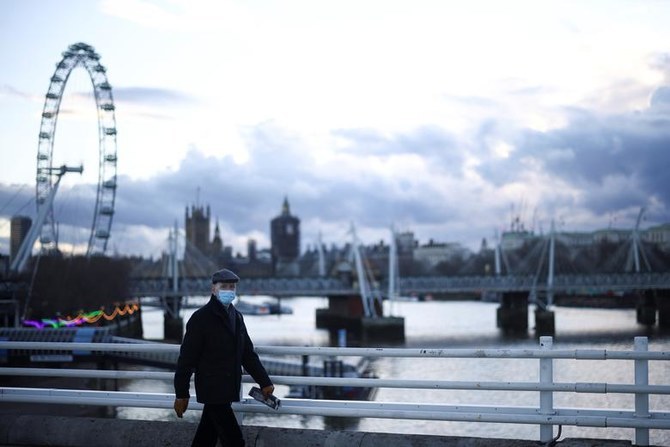LONDON: British Prime Minister Boris Johnson said Thursday he was “anxious” about a rise in the UK of the coronavirus variant first identified in India.
His worries surfaced after a closely-monitored study of infections in England found the variant is becoming more prevalent just ahead of the next big easing of lockdown restrictions.
“It is a variant of concern, we are anxious about it,” Johnson said. “We want to make sure we take all the prudential, cautious steps now that we could take, so there are meetings going on today to consider exactly what we need to do. There is a range of things we could do, we are ruling nothing out.”
In its latest assessment published Thursday, Imperial College London said overall cases have fallen to their lowest level since August following a strict lockdown and a successful rollout of vaccines. However, it warned that the Indian variant should be closely monitored.
The so-called REACT study found that the Indian variant, designated “of concern” because it could be more transmissible, was identified in 7.7 percent of the 127,000 cases tested between Apr.15 and May 3.
Professor Steven Riley from Imperial College said it’s unclear whether the Indian variant is more transmissible but warned that “this is a risk.”
Though the British government and scientists have said new cases may start to go up in coming weeks, it’s unclear whether that will lead to a big increase in hospitalizations and deaths given that most of those people deemed vulnerable have been vaccinated.
Over the past few weeks as India has suffered a catastrophic resurgence of the virus, concerns have grown around the world about potential new variants bypassing the protections offered by vaccines.
Across the UK, lockdown restrictions are being lifted. The next easing in England is set to take place on Monday when two households will be able to mix indoors and pubs and restaurants will be able to serve customers inside, among other changes. The other nations of the UK — Scotland, Wales and Northern Ireland — have also laid out similar plans for the coming weeks.
The government hopes to lift most remaining restrictions on social contact in June.
“At the moment, I can see nothing that dissuades me from thinking we will be able to go ahead on Monday and indeed on June 21, everywhere, but there may be things we have to do locally and we will not hesitate to do them if that is the advice we get,” Johnson said.
The government’s scientific advisory committee, known as SAGE, will be making recommendations about the pandemic’s path. It is due to meet later.
Currently there are few signs the previous easing has led to an increase in new infections, which are averaging around 2,300 a day across the UK, compared with nearly 70,000 recorded in January at the peak of the second wave.
The fall in infections has led to a sharp decline in daily coronavirus-related deaths, with 11 reported on Thursday. Still, the UK has recorded Europe’s highest virus-related death toll, at more than 127,600.
The successful rollout of vaccines has also helped keep a lid on infections alongside the lockdown. Around 54 percent of the British population has had at least one dose of vaccine with about a quarter having received two doses. The rollout is being expanded further, with vaccines now being made available to people aged 38 and 39.
Johnson ‘anxious’ over rise of Indian virus variant in UK
https://arab.news/9bt97
Johnson ‘anxious’ over rise of Indian virus variant in UK

- “It is a variant of concern, we are anxious about it," Johnson said
- Imperial College London said overall cases have fallen to their lowest level since August
Italian PM pledges to deepen cooperation with African states

- The plan, launched in 2024, aims to promote investment-led cooperation rather than traditional aid
ADDIS ABABA: Italy pledged to deepen cooperation with African countries at its second Italy-Africa summit, the first held on African soil, to review projects launched in critical sectors such as energy and infrastructure during Italy’s first phase of the Mattei Plan for Africa.
The plan, launched in 2024, aims to promote investment-led cooperation rather than traditional aid.
Italy’s Prime Minister Giorgia Meloni addressed dozens of African heads of state and governments in Ethiopia’s capital, Addis Ababa, and reiterated that a successful partnership would depend on Italy’s “ability to draw from African wisdom” and ensure lessons are learned.
“We want to build things together,” she told African heads of state. “We want to be more consistent with the needs of the countries involved.”
Ethiopian Prime Minister Abiy Ahmed said Italy had provided Africa with a gateway to Europe through these partnerships.
“This is a moment to move from dialogue to action,” he said.
“By combining Africa’s energetic and creative population with Europe’s experience, technology, and capital, we can build solutions that deliver prosperity to our continents and beyond.”
After the Italy-Africa summit concluded, African leaders remained in Addis Ababa for the annual African Union Summit.
Kenyan writer and political analyst Nanjala Nyabola said tangible results from such summits depend on preparations made by countries.
African governments often focus on “optics instead of actually making summits a meaningful engagement,” she said.
Instead of waiting for a list of demands, countries should “present the conclusions of an extended period of mapping the national needs” and engage in dialogue to determine how those needs can be met.
Since it was launched two years ago, the Mattei Plan has directly involved 14 African nations and has launched or advanced around 100 projects in crucial sectors, including energy and climate transition, agriculture and food security, physical and digital infrastructure, healthcare, water, culture and education, training, and the development of artificial intelligence, according to the Italian government.














